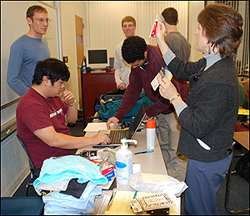Ten biomedical engineering students and their professor will spend spring break (March 8-12) in Guatemala City.
This is the second trip to Guatemala for Associate Professor Cynthia Paschal, who teaches a Service Learning and Leadership course in the biomedical engineering department. She and 12 BME students spent a week in Guatemala in 2009, also during spring break.
 BME associate professor Cynthia Paschal (right) and students pack supplies for their trip to Guatemala. |
Paschal traveled to Guatemala in January to examine hospital equipment that needed repair. Each student was assigned three pieces of equipment to research, to get training, if necessary; to get needed accessories or parts, and to be ready to repair the equipment during their visit.
“There are lots of patient monitors that need repair,” Paschal said. Students will be cleaning out mineral deposits in autoclaves, a device to sterilize equipment and supplies by subjecting them to high pressure steam. They also will be bringing incubators back into service. Repairs on other equipment are planned, too.
“The repairs are ambitious,” said Paschal, who said the group will be bringing “lots of switches, fuses and bulbs.”
During the week they will work in Hospital San Juan de Dios in Guatemala City and visit Manos de Amor clinic, where the BME group worked last year, and visit Siloam School. They’ve added two hospitals in Antigua, the original capitol, to their itinerary. The group also will join engineering students and faculty at Universidad del Valle for a mini-conference.
Students traveling to Guatemala City next week are Lina and Lora Aboulmouna, Elise Adcock-Hinojosa, Ryan Frye, Rosalynne Korman, Toby Li, Christopher Madison, Kyle Mobley, Garrett Spiegel, and Joseph Sun. Korman, Madison and Spiegel went on the spring break trip to Guatemala last year.
“Guatemala is a country the size of Tennessee, with extreme poverty and other entrenched problems,” said Ted Fischer, an anthropology professor and director of the Center for Latin American Studies at Vanderbilt. “This is a place where Vanderbilt is making a huge difference. And we can continue to do so — really changing things for the better in this country.”
Several groups of undergraduate students also are working at sites in Guatemala, bringing the total number of Vanderbilt students in that country during spring break to more than 50. Those include 12 others will work at Primeros Pasos as part of Alternative Spring Break, which for more than two decades has provided undergraduate students with the opportunity to perform service projects as an alternative to the traditional week at the beach.